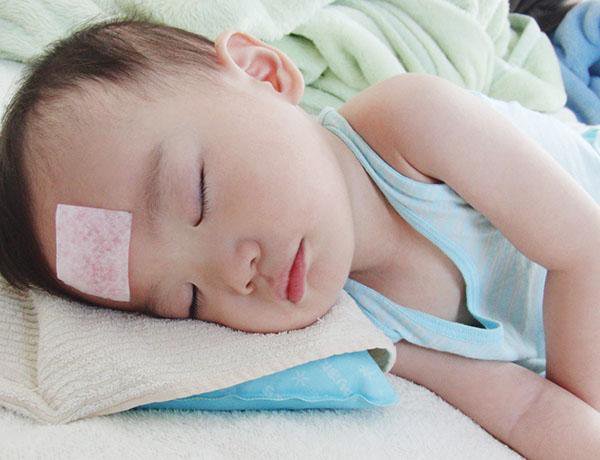Signs of dehydration in children
The article was written by Doctor Pham Lan Huong - Pediatrician, Pediatric Center - Vinmec Times City International General Hospital.
Every day, our body loses some amount of water through sweat, tears, urination or defecation. Water can be lost by evaporation through the skin or by breathing. We often get this water and salt through our diet. For children, greater amounts of water and salt may be lost with fever, diarrhea, vomiting, or prolonged exercise or difficulty drinking. If the child is not replenishing the amount of water lost, signs of dehydration may appear.
1. Symptoms of dehydration
If your child has a fever, diarrhea, vomiting or sweats a lot on hot days or with a lot of physical activity, parents should watch out for the following signs of dehydration:
Dry or sticky lips Crying little or no tears Sunken eyes Baby's front fontanel more palpable Dry, cold skin Irritability, excessive fussiness Drowsiness or dizziness

Trẻ bị sốt li bì trong ngày nắng nóng cần lưu ý triệu chứng của mất nước
2. How to treat a child with dehydration?
It is very important to detect children with signs of dehydration and treat them. The goal of dehydration treatment is to replenish lost fluid (fluid) and maintain normal body fluid levels.
Children with mild signs of dehydration due to activity may only feel thirsty, so drink as much water as the child needs. Filtered water is the best choice. In addition, the child should be rested in a cool, shaded place until the water loss has been rehydrated.
Rehydration When a child shows signs of mild to moderate dehydration due to acute diarrhea, it is necessary to replenish lost fluids immediately. Oresol solution is used to rehydrate the child for a period of 3-4 hours. Oresol solution is a mixture of sugar and salt in a balanced ratio for dehydrated children. This medication is available in many pharmacies without a prescription.
Rehydration begins with 1-2 tablespoons of oresol (about 5-10 ml) over a few minutes. Parents can use a spoon or a syringe. The total amount of supplemental fluid for children in the first hour can be up to 237ml. If the child is making good progress, parents should gradually increase the amount of water little by little.
Children who vomit are often rehydrated this way, because small sips of water are absorbed between vomiting episodes.

Dùng oresol bồi phụ nước cho trẻ
For breastfed infants, breastfeeding should be continued, even during fluid resuscitation. Oresol supplement for babies between feedings. Breastfeeding should be discontinued for formula-fed infants, and re-introduced as soon as possible when the infant shows signs of dehydration.
Do not give dehydrated children water, soda, ginger water, tea, fruit juice, gelatin snacks or chicken broth. Because these types of water do not contain the right ratio of sugar and salt, it can make diarrhea symptoms worse.
When the child is rehydrating, the normal diet can be used, such as breast milk, formula milk.
For children whose dehydration does not improve with Oresol solution, especially children with signs of frequent watery stools or vomiting, or irreversible dehydration due to other causes, the child needs to be treated. hospitalized for intravenous fluid resuscitation.

Những trẻ có dấu hiệu mất nước nặng cần nhập viện để truyền dịch
3. Prevention of signs of dehydration
Need to make sure children drink enough water when sick or physically active to prevent dehydration. Support for children at risk of dehydration is supplemented with enough water. For example, a child with a sore throat may become dehydrated from eating too much pain or taking pain relievers such as acetaminophen or ibuprofen.
Not all cases of fever require treatment, but if the child is uncomfortable or is not getting enough fluids, fever-reducing medications can be used to control the fever.
Pediatrics department at Vinmec International General Hospital is the address for receiving and examining diseases that infants and young children are susceptible to: viral fever, bacterial fever, otitis media, pneumonia in children, .... With modern equipment, sterile space, minimizing the impact as well as the risk of disease spread. Along with that is the dedication from the doctors with professional experience with pediatric patients, making the examination no longer a concern of the parents.
Để đặt lịch khám tại viện, Quý khách vui lòng bấm số HOTLINE hoặc đặt lịch trực tiếp TẠI ĐÂY. Tải và đặt lịch khám tự động trên ứng dụng MyVinmec để quản lý, theo dõi lịch và đặt hẹn mọi lúc mọi nơi ngay trên ứng dụng.
Bài viết này được viết cho người đọc tại Sài Gòn, Hà Nội, Hồ Chí Minh, Phú Quốc, Nha Trang, Hạ Long, Hải Phòng, Đà Nẵng.






